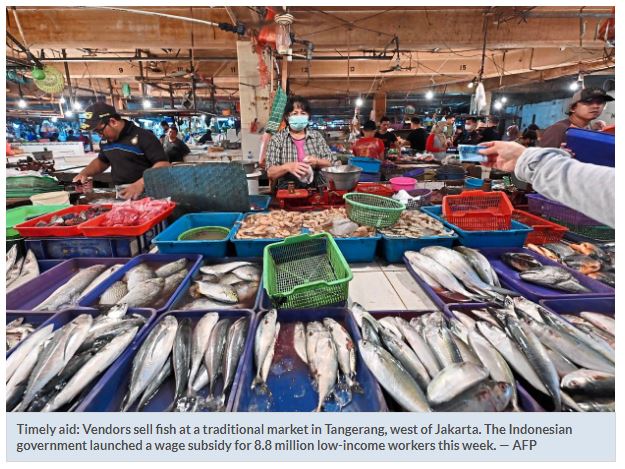Indonesia braces for high inflation
JAKARTA: The government has rolled out new social aid programmes and is restructuring the state budget to cushion the effect of soaring consumer prices on low-income Indonesians.
The Office of the Coordinating Economic Minister launched a wage subsidy for 8.8 million low-income workers this week, as well as cash aid for 12 million micro, small and medium enterprises and direct cash transfers for cooking oil for 23 million homes and small businesses.
The government had intended to discontinue the first two programmes, which were introduced last year, on hopes that the country would achieve a full economic recovery this year.
The new programmes add to existing social aid programmes like the Staple Food Card, Family Hope programme and village fund unconditional cash transfers.
“There will be a transmission of rising global prices to the domestic market, which the government cannot completely pass on to the people.
Therefore, President Joko “Jokowi” Widodo has ordered a strengthening of social protection measures,” Airlangga said at a media briefing after a cabinet meeting in Jakarta.
Rising global commodity prices contributed to a nearly two-year domestic inflation high of 2.64% year-on-year in March. It was the steepest climb since April 2020 but still within Bank Indonesia’s target range of 2% to 4%.
The government’s removal of a price cap on cooking oil was a main driver of the price surge.
Economists expect domestic inflation to keep rising in the coming months in response to the removal of more price controls, higher domestic demand amid easing Covid-19 curbs and the Ramadan and Aidilfitri holidays and a hike in value-added taxes (VAT) that started on Friday.
There is also the risk of a continued rise in global commodity prices due to the Ukraine war.
State-owned oil giant Pertamina raised the price of Pertamax-brand gasoline on Friday as Coordinating Maritime Affairs and Investment Minister Luhut Pandjaitan signalled that Indonesia would raise prices of Pertalite-brand gasoline and three kg liquefied petroleum gas (LPG) canisters in the coming months.
Pertalite and three kg LPG are the most popular brands in their respective goods categories.
Private lender Bank Permata chief economist Josua Pardede estimated that these changes would bring Indonesian inflation to 3.5% this year. If the situation worsened, he added, it could move closer to the government’s upper-end target of 4%, or even surpass the cap.
“If the government raises the price of subsidised Pertalite gasoline, most likely inflation could go above 4%,” Josua told The Jakarta Post .
Government officials say they needed to let go of certain price controls to minimise financial strain and achieve the nation’s goal of reinstating a budget deficit cap of 3% of gross domestic product by 2023.
Finance Minister Sri Mulyani Indrawati said on Tuesday that the government would redistribute a state revenue windfall from surging commodity prices to fund the increased social aid programmes.
Additional funds from the 450 trillion rupiah (RM132.20bil) national economic recovery budget will also be reallocated to the programmes.
“We will maintain purchasing power, the economic recovery and also the state budget,” Sri Mulyani told reporters.
The president instructed his ministers to keep a watchful eye on soaring domestic prices, urging them to hold more meetings to avoid policy mistakes, to speed up social aid disbursement and to communicate policy changes more clearly, including when the government planned to raise state-administered prices.
Shinta Kamdani, deputy chairwoman and coordinator for investment and maritime affairs at the Indonesian Chamber of Commerce and Industry, said that businesses were worried about stagflation, a condition where high inflation meets stagnant economic growth.
Indonesia, like many other countries, was also facing economic risks beyond inflation, she said, pointing to a depreciating rupiah against foreign currencies and monetary tightening in western central banks.
“This could be very dangerous because, in the end, it will create an inconducive environment for the economic recovery and growth in the short to medium term,” Shinta told The Jakarta Post.
To avoid unwanted effects, she said, businesses had hoped that the government would postpone the VAT hike and increase subsidy spending.
Centre of Reform on Economics researcher Yusuf Rendy Manilet said that the government could afford higher social aid spending without sacrificing fiscal consolidation plans because of windfall gains from high commodity prices and higher tax revenue.
He believed middle to high income groups would be mostly undisturbed, as long as the government could keep the Covid-19 caseload low.
“If the compensation or aid received by low-income groups is too little, this higher inflation will drain them,” Yusuf said. — The Jakarta Post/ANN


 English
English




